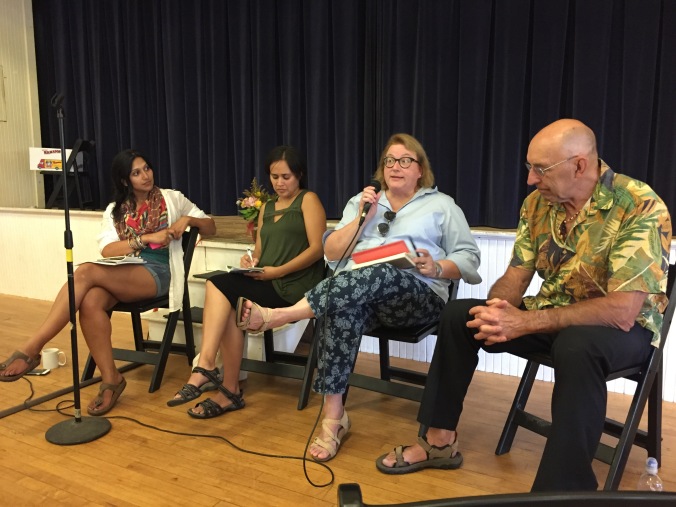by Barbara Burt
During the Power of Words Conference early in August, Caryn Merriam-Goldberg offered a generative workshop called, “Writing the Tree of Life: Midrash to Re-Vision Our Lives.” As she explained, “Midrash is the Hebrew tradition of re-interpreting and re-visioning our guiding myths and messages to foster greater meaning, freedom, and authenticity.” After examining different examples of midrash, she invited us to consider it in our writing. For some reason, the folktale of Snow White popped into my head. This and Sleeping Beauty and all the other tales of damsels in distress have long bothered me; these girls sleep until awakened by a handsome prince’s kiss—how passive and unimaginative those heroines are! Yet, through the power of Disney and myriad children’s books, they are role models buried deep in many young women’s consciousness.
I believe that midrash specifically refers to retelling or commentary on the Torah; Snow White is no sacred text but it does carry cultural weight. I decided to try a retelling of Snow White in a poem. Other workshop participants created awe-inspiring poems and stories—all in a scant half hour, once again illustrating the creative power of silently writing together.
Here is the result of my effort, with a bit of editing since the workshop.
Snow White Remembers
I was not beautiful.
That is an embellishment added by the Grimms,
who couldn’t imagine a commonplace heroine.
And my stepmother didn’t really hate me.
She read rebellion behind my solemn stare,
resentful questions in the crick of my eyebrow.
Because she recognized a vestige of the same in her
(tamped down,
smothered)
She had to murder it in me.
But I do not know if she poisoned that apple pie on purpose.
She was a terrible cook.
I’d known those seven woodsmen since childhood.
Caught in a thunderstorm, I came upon their clearing
and sheltered in their cabin.
It was strewn with books left by an unnamed professor long ago.
He’d tried solitude on a summer sabbatical,
only to flee, books in his wake.
As I grew, I escaped to the those bookshelves
when I could,
drinking in word of other lands, other lives.
The loggers paid no mind to my visits.
They were busy in the woods most days.
And I was neat, straightening and dusting
the rows of books.
I left bouquets of wildflowers and pine boughs on the table.
On the day the illness came upon me,
I ran to the cabin after the compulsory midday meal at home.
(Apple pie to finish.)
I was sixteen and sick of arguing,
and the cabin had an extra bunk where I could stay.
I chose a stack of books from the shelves
and buried myself under blankets.
In a day or two I could keep food down again.
She doesn’t want to be found, said the loggers,
turning away searchers at their door.
A year went by
as I read through the pile
until few titles remained.
I was restless;
my attempts to help with cabin upkeep
bored me.
Chipmunk chatter was no longer delightful.
Almost a housewife, I was no longer just playing house.
The loggers were kind
but their table talk described saws and stands of trees
and they were snoring by dusk.
So when they spoke of a young man new in town,
I listened.
He is kind to us, they said.
He fingers tunes on his fiddle.
He carries a well thumbed journal
with poems and colored sketches of birds.
Shall we invite him here? they asked.
Perhaps, I said,
coolly.
But I was fire inside.
That day I entwined flowers in my braids,
chose my eyelet blouse,
and rehearsed clever conversation.
I spied him walking up the path,
deep in thought,
and was pleased by his brown curls and open expression.
Just as he knocked, I opened the door,
and I kissed him.
 Kelly is a poet, playwright and expressive arts workshop facilitator who loves leading new and experienced writers through dynamic writing exercises and meaningful sharing that leave you feeling engaged, intrigued and surprised by the depth of your experience. Kelly’s award winning plays have been produced around the US and Canada, and are published by
Kelly is a poet, playwright and expressive arts workshop facilitator who loves leading new and experienced writers through dynamic writing exercises and meaningful sharing that leave you feeling engaged, intrigued and surprised by the depth of your experience. Kelly’s award winning plays have been produced around the US and Canada, and are published by  Joanna Tebbs Young, MA-TLA, a graduate of Goddard College’s Transformative Language Arts concentration, is a freelance writer and Expressive Writing facilitator and coach living in Rutland, Vermont. Her book,
Joanna Tebbs Young, MA-TLA, a graduate of Goddard College’s Transformative Language Arts concentration, is a freelance writer and Expressive Writing facilitator and coach living in Rutland, Vermont. Her book, 



 Melissa Rose
Melissa Rose Friday was rainy. We dodged puddles and huddled on porches as we waited for the conference to begin.
Friday was rainy. We dodged puddles and huddled on porches as we waited for the conference to begin. True Story Theater of Boston opened the conference with a wonderful playback theater presentation. The topic was stigma, and five or six conference members shared examples of the pain that stigma caused to them or someone close to them. After the personal telling, the troupe acted out (played back) an improvised drama based on the personal story.
True Story Theater of Boston opened the conference with a wonderful playback theater presentation. The topic was stigma, and five or six conference members shared examples of the pain that stigma caused to them or someone close to them. After the personal telling, the troupe acted out (played back) an improvised drama based on the personal story. Saturday morning was filled with workshops, all enticing. A small group gathered for Barb Asen’s workshop “Love Is all there Is: Mantra Singing for All” — a calm way to start a hectic day. Here’s Barb listing to the vibration from the voices as a song ends.
Saturday morning was filled with workshops, all enticing. A small group gathered for Barb Asen’s workshop “Love Is all there Is: Mantra Singing for All” — a calm way to start a hectic day. Here’s Barb listing to the vibration from the voices as a song ends. Susan Bennett-Armistead gave a keynote address at noon about the importance of reading aloud, “Read it again! Read it again! How Read Aloud Builds Brains and Changes the World.” Here she is showing her five-year-old’s “literate” scribbles, already demonstrating an understanding of many conventions of western writing.
Susan Bennett-Armistead gave a keynote address at noon about the importance of reading aloud, “Read it again! Read it again! How Read Aloud Builds Brains and Changes the World.” Here she is showing her five-year-old’s “literate” scribbles, already demonstrating an understanding of many conventions of western writing. Diane Glass serves as a spiritual director, helping individuals find meaning and purpose in their lives by deep listening and companionship. She teaches at the Des Moines Pastoral Counseling Center on the role of the body in revealing our significant life stories. In October 2015, she published a memoir, This Need to Dance: A Life of Rhythm and Resilience (Amazon).
Diane Glass serves as a spiritual director, helping individuals find meaning and purpose in their lives by deep listening and companionship. She teaches at the Des Moines Pastoral Counseling Center on the role of the body in revealing our significant life stories. In October 2015, she published a memoir, This Need to Dance: A Life of Rhythm and Resilience (Amazon). A native New Yorker, who’s now living her dream of a sustainable life in Hawai’i with wife, Holly, Eila Algood has been expressing herself through writing since childhood. Her published works include, “On The Road To Bliss, A Poetic Journey”, “Rhapsody in Bohemia”, pieces in Frida Magazine and Think Pink Anthology.
A native New Yorker, who’s now living her dream of a sustainable life in Hawai’i with wife, Holly, Eila Algood has been expressing herself through writing since childhood. Her published works include, “On The Road To Bliss, A Poetic Journey”, “Rhapsody in Bohemia”, pieces in Frida Magazine and Think Pink Anthology.